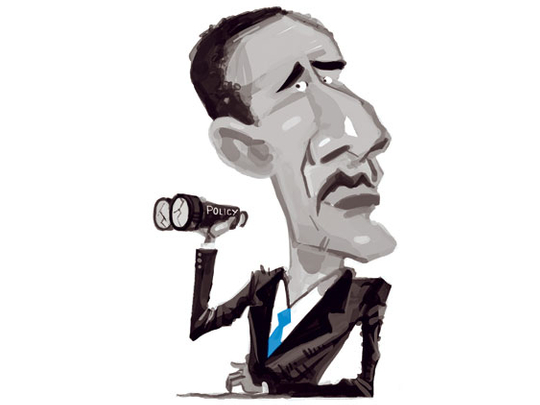
US President Barack Obama will be in Europe today. He will be well received. Not much more. The president's lustre has faded. Obama shows a better understanding than most of the tumultuous upheavals in the world. Yet a fair account would say that intelligent intent has not been matched by sufficient grit.
The speeches — the latest on the Arab uprisings — are fine; better than fine really. They acknowledge the complexities of the choices: the unenviable trade-offs between short-term security and long-term strategic interest, and the limitations as well as the reach of US power.
After a period of sustained and intense dithering, Obama has now found a framework to put the US on the right side of the Arab Spring. Until recently, he had been an inadvertent prisoner of his predecessor. So anxious was he to signal a break with former president George W. Bush's democratic mission that Obama embraced the pinched realism of narrow national interest. This latest speech puts him back on the side of democratic values.
The doubts are about follow-through. Having set out his hopes, will Obama invest serious political capital to support them? His administration's decision this week to impose sanctions on Bashar Al Assad's Syrian regime is one encouraging sign. But we have been here before. You might say that Obama has turned out to be too much of a, well, European. No one cheered louder than his peers on the other side of the Atlantic when he won the White House. Now these leaders see in the president an uncomfortable reflection of their own frailties.
Obama, these distant admirers used to say, was careful, deliberative and admirably reluctant to rush into wars. What more could they ask after the Wild West policies of the Bush years. The snag is that laudable caution and scholarly reflection can drift easily into indecision. It was left to France and Britain to press the case for intervention against Libya's Muammar Gaddafi.
Immediate tests
The killing of Osama Bin Laden has banished some of the doubts in the US about presidential resolve. It is still too soon to say how long the effect will last. Supporters understandably hope the burnishing of his credentials as commander-in-chief has secured Obama a second term. Sceptics note that victory in the 1991 Gulf war did not rescue former president George H.W. Bush. The economy counts for more in the end.
In Cairo two years ago Obama spoke eloquently about restoring America's moral authority in the Muslim world. He was right: the charge of double-standards had become a powerful weapon in the hands of adversaries. Pretty soon, though, it was back to business as usual in support of the region's autocrats. Talking about democracy was one thing; it was another to challenge Egypt's then leader Hosni Mubarak.
Obama faces two immediate tests. The first is in Afghanistan. Here his administration has promised a diplomatic surge to promote the only thing that can end the war — a political settlement. Without such an initiative, the commitment to begin the pull-out of US troops this year will look like a rush for the exit.
Thus far, though, talk of reconciliation with the Taliban, of amendments to the Afghan constitution to recognise the historic decentralisation of power and of the engagement of Kabul's neighbours has been just that — talk.
Still more pressing is what used to be called the Middle East peace process. This week Israel's Prime Minister Benjamin Netanyahu is in Washington setting terms that he knows the Palestinians can only reject.
Netanyahu's implacable opposition to Palestinian statehood is a rare constant in the region. The expansion of illegal colonies in the West Bank has mocked US attempts to advance an even-handed approach. It has also cost Israel most of its friends.
The remaining option for Obama is to announce publicly the essential parameters for a settlement that would guarantee Israel security and the Palestinians a viable state. He has taken one step in that direction by reaffirming the region's 1967 borders as the basis for an agreement.
White House aides argue that to set out the rest of the framework would risk his prestige. Maybe. But the US is not in control of events. Doing nothing carries its own dangers. Obama has a strategic choice. He can help shape the future. Or he can analyse it.
— Financial Times












